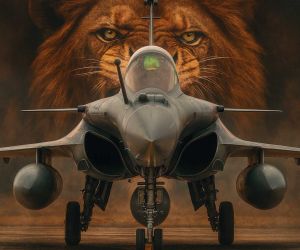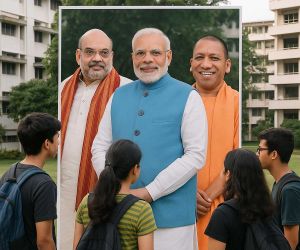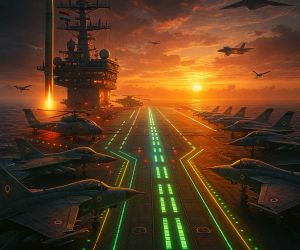MORE COVERAGE
Twitter Coverage
Satyaagrah
Written on
Satyaagrah
Written on
Satyaagrah
Written on
Satyaagrah
Written on
Satyaagrah
Written on
JOIN SATYAAGRAH SOCIAL MEDIA
"War is costly, peace is priceless": India's pivotal role in BRICS is shaping the narrative amid Ukraine crisis, championing dialogue and diplomacy, its influence in fostering global harmony is becoming increasingly evident on the international stage

In the heart of geopolitical complexities, a hopeful scenario is unfolding. India, with its increasing global prominence, is becoming a key player in shaping the outcomes of major international dilemmas. A shining testament to this is the Ukrainian crisis, where nations are looking towards India and its allies in the Global South and BRICS to mediate and carve a way forward.
|
To understand the magnitude, let’s rewind a bit. On August 5th, Saudi Arabia played host to an important event - a meeting of diplomatic national security advisors and political directors. This was a follow-up to a similar initiative that commenced in Copenhagen in June. Their goal? To establish a sustainable and fair peace in Ukraine.
The gathering witnessed participation from over 40 countries, both in person and online. Among them were members of the BRICS association - India, China, Brazil, South Africa, and even Russia.
Yet, Russia was forthright in its stance. Moscow was quick to point out that the Ukrainian Peace Formula, having ten points, didn’t resonate with their perspective. Maria Zakharova, the voice of the Russian Foreign Ministry, elucidated Russia’s position. She expressed that Russia looks forward to understanding the assessments of its BRICS counterparts, especially in light of the 'peace formula' that the West and Kyiv are ardently promoting.
Moscow's core argument? The emphasis on Zelensky's peace formula is overshadowing the peace initiatives proposed by other countries. Such an approach, in Russia's view, is an attempt by the West and Kyiv to monopolize peace-building efforts in the region.
|
Amidst this, the beacon of hope was India. Ajit Doval, India's National Security Advisor, who was present in Jeddah, reiterated India's unwavering stand - that the solution lies in dialogue and diplomacy. This resonates with India's consistent approach in global matters, always urging nations to sit, discuss, and find a middle ground.
The bonds don't end there. After significant discussions in Jeddah, Andriy Yermak, leading the Ukrainian Presidential Office, has been in consistent touch with Ajit Doval. Their connection can be traced back to a vital meeting between Indian Prime Minister Narendra Modi and Ukrainian President Volodymyr Zelensky in Hiroshima, Japan, this May. It was the first interaction between the leaders since the Russia-Ukraine conflict ignited.
Yermak is optimistic. He believes that the consultations in Jeddah have pushed Ukraine a step closer to realizing President Zelensky's peace formula. He confidently stated that with every move, more countries are recognizing and supporting Ukraine's sovereignty, independence, and territorial integrity.
Now, the world waits with bated breath for the upcoming 15th BRICS Summit in Johannesburg, from August 22 to 24. It promises to be a monumental event, marking the first in-person BRICS leaders’ assembly in three years. The summit, graced by top leaders like Prime Minister Narendra Modi and the presidents of Brazil, China, and host nation South Africa, carries enormous expectations. Although President Putin won't be present, Foreign Minister Sergei Lavrov will represent Russia.
In Johannesburg, the anticipation is that Prime Minister Modi will amplify his vision. Leveraging India's G20 presidency, he aims to emphasize the voices of the Global South. This focus on South-South Cooperation showcases India's intent to collectively mold global agendas.
|
As a prelude to this significant event, Lavrov had a discussion with his Chinese counterpart, Wang Yi. Their conversation spanned various pressing issues, with the Ukrainian crisis at the forefront.
In essence, India's role and influence in global geopolitics are rapidly expanding. As the Ukrainian crisis unfolds, the world is witnessing India’s steadfast commitment to dialogue, diplomacy, and global cooperation. The nation emerges as a symbol of hope, showing the world that peace is possible through collaboration and understanding.
 Support Us
Support Us
Satyagraha was born from the heart of our land, with an undying aim to unveil the true essence of Bharat. It seeks to illuminate the hidden tales of our valiant freedom fighters and the rich chronicles that haven't yet sung their complete melody in the mainstream.
While platforms like NDTV and 'The Wire' effortlessly garner funds under the banner of safeguarding democracy, we at Satyagraha walk a different path. Our strength and resonance come from you. In this journey to weave a stronger Bharat, every little contribution amplifies our voice. Let's come together, contribute as you can, and champion the true spirit of our nation.
 |  |  |
| ICICI Bank of Satyaagrah | Razorpay Bank of Satyaagrah | PayPal Bank of Satyaagrah - For International Payments |
If all above doesn't work, then try the LINK below:
Please share the article on other platforms
DISCLAIMER: The author is solely responsible for the views expressed in this article. The author carries the responsibility for citing and/or licensing of images utilized within the text. The website also frequently uses non-commercial images for representational purposes only in line with the article. We are not responsible for the authenticity of such images. If some images have a copyright issue, we request the person/entity to contact us at This email address is being protected from spambots. You need JavaScript enabled to view it. and we will take the necessary actions to resolve the issue.
Related Articles
- "There is no path to peace. Peace is the path": NSA Ajit Doval's arrival in Jeddah represents India's commitment to dialogue and diplomacy, his belief - a peaceful resolution to the Ukraine conflict - remains India's utmost priority and greatest desire
- "Past lessons, future cautions": As global leaders dance delicately with nuclear words, the looming shadow of today's 'mushroom cloud' is a power beyond imagination, Modern hydrogen bombs bear a potency that could overshadow Hiroshima's dark past
- "Unity in strategy, strength in partnership": Amid China's rising influence in the Indo-Pacific, Germany strengthens military relations with 'reliable' India, eyeing secure trade routes and strategic collaborations while stepping up military ties
- "Greed's frontier: The harsh truth of expansionism": Amid the furore over China releasing a new map, Ex-Chief of Army Staff General Manoj Naravane shared a map of China and took a dig saying "finally someone has got the map of China as it really is"
- "We participate in a tragedy; at a comedy we only look": Ukrainians are all set and prepared for a Russian "Nuclear threat" by organizing a wild massive orgy on Shchekavystsa hill just outside of Kiev, with more than 15000 people subscribing for the event
- "Zara ahista mar tamacha-e-zindagi, Chehre pe nishaan dikhne lage hain": Russian court fined $374 million to American search giant Google for its failure to delete prohibited information on conflict in Ukraine, ask to remove all “misleading information”
- Bangladesh and India put the final nail in the coffin of China’s ‘String of Pearls’ with access to Chittagong port as it was offered by PM Sheikh Hasina for use by India for trade and uninterrupted commerce
- "The most successful war seldom pays for its losses": Russia claims victory in Ukraine referendums, paves way for annexation, Pro-Moscow officials said all four occupied regions of Ukraine voted to join Russia, but many Western leaders calling it a sham
- SFJ terrorist of radical Khalistani movement arrested in Germany due to Diplomatic pressure. Can Canada and UK be next?
- Blacklist term may end this month for New Zealand YouTuber Karl Rock, had insinuated Govt of India’s personal vendetta against him in a recent video
- Terrorism, Pakistan, COVID, Afghanistan and more: Here’s all that PM Modi and US VP Kamala Harris discussed in the bilateral meet
- "300 meetings, 200 hours, 15 drafts and the indomitable spirit of 4 diplomats": Discover the untold behind-the-scenes efforts at the monumental G20 Summit in forging a consensus on the Ukraine issue, marking a significant milestone in global diplomacy
- "The hardest thing in life to learn is which bridge to cross and which to burn": Russian anti-terrorism confirms truck bombing damaged strategic Crimean Bridge that connects peninsula with mainland Russia, Mikhail Podoliak tweeted blast as “the beginning”
- "G20 New Delhi Leaders' Declaration" released post-consensus at the summit unveils a unified vision: "One Earth, One Family, One Future", Global leaders pledge to usher in a green, inclusive, and resilient future, highlighting India's contributions
- "Powering today, preserving tomorrow": Prime Minister Narendra Modi announces India's commitment to produce 50% of its electricity from non-fossil fuels by 2030 at G20 Energy Ministers meeting, emphasizing the country's dedication in climate action

























